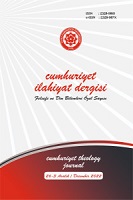İlahiyat Fakültesi Öğrencilerinde Din ve Modernleşme -Sivas Cumhuriyet Üniversitesi Örneği
Religion and Modernization in Theology Faculty Students -The Case of Sivas Cumhuriyet University
Author(s): Şaban ErdiçSubject(s): Ethics / Practical Philosophy, Higher Education , Sociology of Education, Sociology of Religion
Published by: Cumhuriyet Üniversitesi İlahyat Fakültesi
Keywords: Sociology of Religion; Religion and Modernization; Sivas Cumhuriyet University; Faculty of Theology; Postmodern Ethics;
Summary/Abstract: In the context of the main principles, modernity has affected the relationship of individuals with society in two ways; either by promoting a comprehensive individualization or by paradoxically surrendering individual freedoms to new relations due to the many risks it carries. In the modernization process, religion has been affected not only in the context of traditional and everyday patterns; but also, it has been significantly influenced in terms of its dimensions corresponding to the public space. This study examined the relationship between religion and modernization in the sample of Theology Faculty at Sivas Cumhuriyet University which is an organized and official field of religion. The aim of the research is to understand and explain the aspects of modernization in theology faculties that look at individual identity through some concepts such as religion and world designs, pluralism, perspectives on lifestyles, attitudes towards gender, and consumption. In line with these goals, the article problematizes the relations between the attitudes and behaviors of the participants due to modernization and the religious theory of orthodox Islam, political secularism, globalization, and socioeconomic and cultural environments. Within a qualitative method, the research was planned as a "single event" study. With the help of semi-structured interview questions, the data obtained from a sample group consisting of male and female students from different classes by techniques such as "problem-centered interview", "narrative", "participated observation" were theoretically analyzed from interactionist, ethnomethodological, and phenomenological perspectives. Considering its sources, theology in Turkey was shaped under the intense influence of Jacobin and elitist political secularism during the first three quarters of the Republic. In the last quarter of its century-old history, it can be said that a conservative, Islamist secularism was effective there. In this context, the status accorded to religion by the political institution in its authoritarian structure in Turkey, on the one hand, makes sense in terms of the shape and direction of religion and society relations, on the other hand, it gives an idea about the general situation of theology as an official educational institution and the contents of the roles and functions expected from it. For this reason, it is understood that the future of theology in Turkey will be shaped depending on the politics, religion, human, and society paradigms of the political bureaucracy for now, whether in terms of human resources and public visibility or within the scope of the relations of institutional religion with society. All these are related to the social realities as well as the central position and character of politics in the society in Turkey. Besides, these realities strongly show the close relationship of theology with Turkish modernization. For this reason, in this study, political secularism has been seen as an important component of religion and modernization relations in theology. However, this relationship is not with a onesided point of view that secularism affects theology; from the perspective that theology also affects the direction and forms of modernization and secularization in Turkey, it is discussed in a mutual way. As a matter of fact, as it can be seen, while theology was functionalized for the construction of the nation-state and a secular society paradigm in most of the history of the republic, it also produced an alternative, Islamic secularization related to a postmodern ethics by approaching the ontological, epistemological, and aesthetic designs of religion and world of environmental movements in more modern periods. Today, theology students, like every student, are faced with fluidizing all the artificial and natural boundaries of modernity and their traditional environments outside their own borders, and at the same time being a member of a wider world without borders. These developments, which clearly point to a change in attitude and attitude towards the secular field, are not only for theology students to reach new values in religion and world relations; it has also been important in the context of their entering into very important conflicts and tensions in the context of their individual identities. Finally, when it was associated with “orthodox Islam”, it was seen that this new socialization environment and the tension created by these created a series of alienation in theology in the context of gender, lifestyles, leisure activities, and consumption.
Journal: Cumhuriyet İlahiyat Dergisi
- Issue Year: 26/2022
- Issue No: 3
- Page Range: 1021-1035
- Page Count: 15
- Language: Turkish

